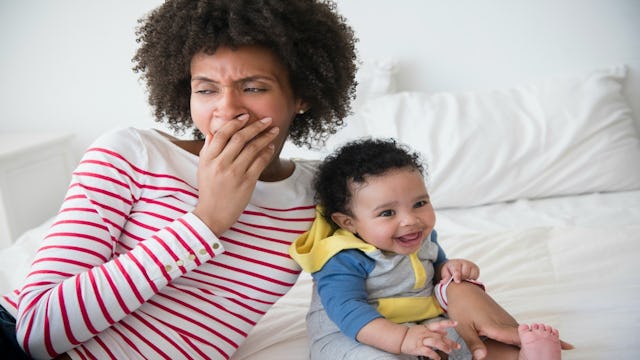What Sleep Deprivation Is Really Doing To You

We are an exhausted nation.
No matter your level of education, your yearly salary, your race, religion, gender, or where you live — chances are you’ve experienced serious sleep deprivation at one time or another. In college, it was normal and fun to grab three hours a night, because you could make up for it later in the day. In your early working years before children, you were probably able to manage 5-6 hours of sleep a night for weeks, even months, on end. Youth, big career goals, and a household without a baby in it, meant you were able to function on little sleep and spend your weekends catching up.
And then parenthood walloped you on the wrong side of the pillow, and you honestly can’t remember the last time you slept more than five hours straight.
Experts will tell you that newborn sleep patterns are unpredictable and come in short spurts, and that it will pass within six months, and eventually the whole family will sleep again. They’re flat out wrong, because I have yet to meet a new mom, or a mom of preschoolers, or a mom of school-aged kids, or moms of tweens, or moms of teens (you get the idea) who can say they sleep great and can manage to snooze for the recommended 7-9 hours of sleep per night.
Nobody is sleeping. NOBODY. And whether it’s because you’re up with a crying baby, or up pacing the floors waiting for a teenager to make curfew, the bottom line is you are up at night and totally exhausted the next day.
Women have become masters at functioning on no sleep, and have subsequently adjusted what we think of as a “full night’s sleep” after having children. Remember before kids when eight hours felt like, “Wow that was a lot of sleep!” Enter babies, and now if you get six straight hours, you’re praising the sleep Gods and feel like a new woman.
But even if you feel like a new woman, you’re not, and neither are your body’s physiological and mental health functions. They’re screaming for rest, and if you take the time to listen, you’ll see they’re sending out loud and clear signals that sleep needs to become a priority for you, before they shut your whole body down.
Our country’s sleep deprivation crisis is slowly killing us. Literally.
The more we learn about how important adequate sleep is, the more we learn about how damaging the effects are of not getting enough.
So what is not sleeping really doing to your body? Plenty of scary and potentially unhealthy things:
1. Chronic sleep loss and deprivation put you at high risk for many diseases.
Such as a 36% increase in colorectal cancers, a 48% increase in developing heart disease, three times more likely to develop Type 2 Diabetes, 50% higher risk for obesity, 33% increase in dementia risk, and an increase in high blood pressure. And those are just touching the surface of health issues. Because lack of sleep literally puts your immune system functions on hold, this means you’re also susceptible to more everyday illnesses, like viruses, colds, and infections from common bacteria. Sick a lot? You might not be sleeping enough.
2. Mood
Lack of sleep causes serious mood disorders, and we’re not just talking about walking around with the occasional brain fog, or being more forgetful after a poor night’s sleep. We’re talking about long-term mental and behavioral effects from no sleep. People diagnosed with depression and anxiety are more likely to sleep less than six hours per night, and the common sleep disorder insomnia has one of the strongest links to depression — with people five times more likely to suffer from it when not getting adequate sleep.
Lack of sleep is also linked to higher levels of hostile type behaviors, and more negative emotions all around. And a new study on the effects of working memory found that women are far worse off than men when it comes to memory loss and poor work performance caused by lack of sleep.
3. Premature Aging
When you don’t sleep enough, your body releases the stress hormone cortisol, which in turn increases the breakdown of your skin’s collagen — the protein that keeps your skin smooth and elastic. And in a study by beauty giant Estee Lauder, researchers found that “poor sleepers had increased signs of skin aging and slower recovery from a variety of environmental stressors, such as disruption of the skin barrier or ultraviolet (UV) radiation. Poor sleepers also had worse assessment of their own skin and facial appearance.”
4. Driving Dangers
This is perhaps the scariest statistic of them all when it comes to the effects of lack of sleep. In a report by the AAA Foundation for Traffic Safety, researchers found that drivers who slept only five or six hours in a 24-hour period were twice as likely to crash as drivers who get seven hours of sleep or more.
They also found the less sleep the person behind the wheel gets, the higher the crash rate. When looking at drivers who only had four or five hours of sleep the night before, they have four times the crash rate. That’s about the same as among drunken drivers.
If those four reasons don’t have you re-thinking your sleep routine, I don’t know what will. Talk to your doctor about the options available to you to get your sleep back on track, before you wind up sick as a dog, dealing with chronic illness and looking a decade older than you really are.